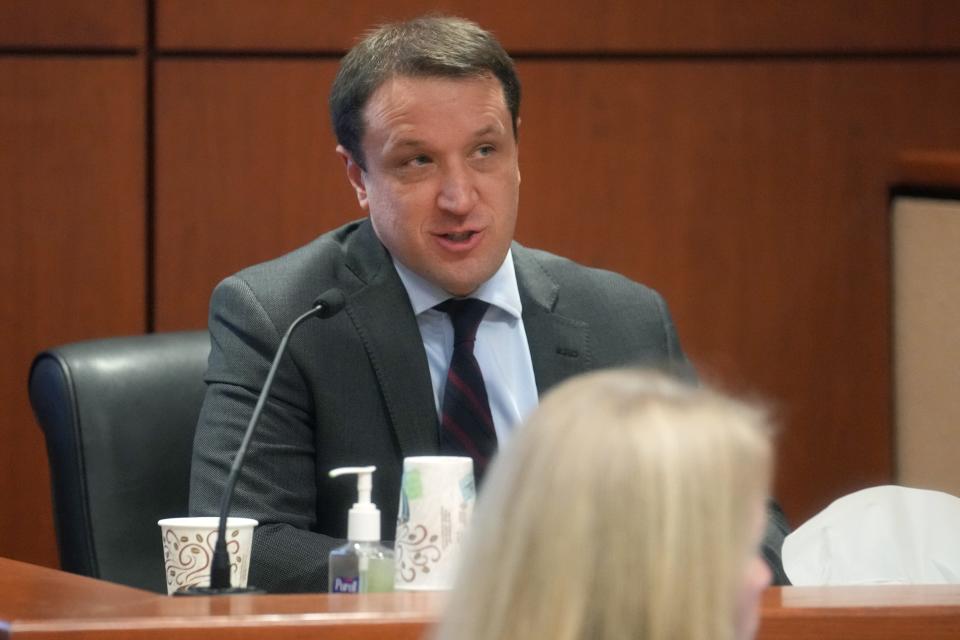Kari Lake's 2-day election trial wraps up; judge to decide
- Oops!Something went wrong.Please try again later.
- Oops!Something went wrong.Please try again later.
Kari Lake’s two-day election challenge ended Thursday without any evidence presented that election problems were engineered by Maricopa County officials and her opponent.
Maricopa County Superior Court Judge Peter Thompson, who oversaw the short trial, said after closing arguments by attorneys he would soon render his opinion but that it would not be before “five o’clock.” Legally, he has five days to decide whether Lake proved her case.
The Republican candidate for governor is fighting to prove the Nov. 8 election was rigged against her, causing a loss by more than 17,000 votes to Democrat and Secretary of State Katie Hobbs. After the election, Lake filed a lawsuit challenging the results and highlighting Election Day problems that frustrated voters at some polling locations.
Long lines were one result after vote-counting machines called tabulators failed to read several thousand ballots; officials blamed the printers that print out the ballots.
For subscribers:Here are key facts and additional information behind the claims in Kari Lake's election challenge
Thompson tossed out eight of her 10 allegations but allowed the evidence trial to proceed on the remaining two. Lake had a high bar to clear from the outset: Thompson said she must show that the printer malfunctions were intentionally rigged to affect the election results, and that the actions "did actually affect the outcome."
The second day of hearings was dominated by testimony by Rich Baris, a conservative writer and pollster called to the stand by Lake’s legal team to discuss Baris’ theory that his polling data shows Lake would have won but for the polling-site issues.
Day 1 of trial:No evidence of misconduct in first day of Kari Lake election-challenge trial
Baris, who runs Florida-based Big Data Poll, said that he asked 813 Maricopa County residents who voted on Nov. 8 about their experiences and found that 32% had some sort of issue with voting. Twenty percent of those voters didn’t return an exit poll, a figure he found unusually high.
Adding in all the pertinent data and taking interviews of voters into account, he concluded that the polling-site problems disenfranchised 15,000 to 29,000 voters. Based on day-of ballot returns, the analysis showed that if overall turnout had been 2.5% higher, Lake would have won.
“It definitely impacted the outcome,” Baris said. “It was substantial enough to change the leaderboard.”

Christina Ford, a lawyer for Hobbs, attempted to impugn Baris’ credibility by pointing out that his company has been given an “F” rating by Nate Silver’s 538 site, which has banned the firm while aggregating the results of more than 400 polling companies nationwide.
Defense lawyers also brought in University of Wisconsin-Madison Professor Kenneth Mayer to explain election procedures and debunk Baris’ theory. Mayer accused Baris of using “sleight-of-hand” in his analysis.
“This is all just a counter-factual he’s making up,” Mayer said.
Lawyers for Hobbs and the county also put Rey Valenzuela and Scott Jarrett on the witness stand, the co-directors of the county’s Elections Department, to explain how ballots are transported with a secure chain-of-custody and refute contentions of sloppiness and legal violations alleged by Lake’s side.
Jarrett, who also testified on Wednesday, sparked murmurs from Lake’s entourage in the courtroom visitors’ benches when he disclosed that he knew some of the printers’ problems were due to county technicians hitting a “shrink to fit” setting that made the ballots unreadable. Jarrett seemed to specifically refute that problem had occurred in his previous testimony when asked about it by Lake’s attorneys.

The argument was based on Lake witness and IT professional Clay Parikh, who had testified that in his opinion, the widespread printer problem could only have stemmed from an improper ballot-style printer setting that printed 19-inch ballots on 20-inch ballot paper. Parikh concluded that such a mistake could not have been an accident.
However, another Lake witness testified that toner issues were part of the problem, contradicting Parikh. Jarrett and Valenzuela also testified that no 19-inch ballot image existed in county software, and that all unreadable ballots would have been counted eventually, anyway.
The two co-directors carefully painted a picture of a highly secure election in which every tamper-resistant seal, every box of ballots and every transport of ballots was documented. Their testimony attempted to debunk affidavits by an election observer and employee of Runbeck Election Services, which contracts with the county, describing security violations including inserting Runbeck employee ballots into the voting system illegally.
Runbeck, asked about the allegations, told The Arizona Republic they would not comment about the case until it was finished.
In closing arguments, Hobbs lawyer Abha Khanna noted that the observer and Runbeck employee didn’t testify as expected, which she said may reflect “these witnesses acknowledge the limitations of their own personal observations.”
For subscribers:Deleted tweets ignite new GOP election conspiracy about Katie Hobbs
She called Baris’ conclusions “nonsensical” and that his own math showed the Election Day turnout — already in record territory — would have had to increase by a whopping 16% to affect the election.
Kurt Olsen, one of Lake’s lawyers, said the defense arguments about printer settings being arbitrarily changed by technicians “don’t make sense.”
Lake’s team put out “solid evidence” to prove their claims, Olsen said.
Reach the reporter at rstern@arizonarepublic.com or 480-276-3237. Follow him on Twitter @raystern.
This article originally appeared on Arizona Republic: Kari Lake's 2-day election challenge trial ends; judge now decides

